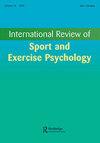Psychological safety in sport: a systematic review and concept analysis
IF 6.7
2区 心理学
Q1 HOSPITALITY, LEISURE, SPORT & TOURISM
International Review of Sport and Exercise Psychology
Pub Date : 2022-02-02
DOI:10.1080/1750984x.2022.2028306
引用次数: 19
Abstract
There has been a rapid proliferation of empirical research on the relationship between sport participation and mental health. As a result of this movement, there has been an increased focus on the constructs that can predict or explain mental health outcomes in sport. Psychological safety in sport is among the constructs surfaced in the movement. Despite this, there is a considerable lack of conceptual clarity regarding how to define psychological safety and how it can be fostered in sport. As such, the aim of this study was to provide conceptual clarity of the term psychological safety in the context of sport. To achieve this aim, we first systematically searched for all currently available studies that have discussed psychological safety in a sport context. Then, a concept analysis approach was applied wherein the definitions, attributes, antecedents, and consequences were thematically analysed across 67 studies. As a result of this synthesis, psychological safety in sport was conceptualised as a continuous, group level construct that is perceived (and reported) at an individual level. We also provide a descriptive model of psychological safety in sport that we hope lends clarity and debate to the field moving forward.体育运动中的心理安全:系统回顾与概念分析
关于体育参与与心理健康之间关系的实证研究迅速涌现。由于这场运动,人们越来越关注能够预测或解释体育运动中心理健康结果的结构。体育运动中的心理安全是运动中出现的结构之一。尽管如此,关于如何定义心理安全以及如何在体育运动中培养心理安全,人们在概念上相当缺乏明确性。因此,本研究的目的是为体育背景下的心理安全一词提供概念上的清晰度。为了实现这一目标,我们首先系统地搜索了目前所有讨论体育背景下心理安全的研究。然后,应用概念分析方法,对67项研究的定义、属性、前因和后果进行主题分析。由于这种综合,体育运动中的心理安全被概念化为一种连续的、群体层面的结构,在个人层面上被感知(和报告)。我们还提供了一个体育运动中心理安全的描述性模型,我们希望它能为该领域的发展提供清晰和辩论。
本文章由计算机程序翻译,如有差异,请以英文原文为准。
求助全文
约1分钟内获得全文
求助全文
来源期刊
CiteScore
17.30
自引率
9.10%
发文量
33
期刊介绍:
International Review of Sport and Exercise Psychology is the first scholarly, peer-reviewed journal that publishes critical reviews of research literature in sport and exercise psychology. Typically, these reviews evaluate relevant conceptual and methodological issues in the field and provide a critique of the strengths and weaknesses of empirical studies that address common themes or hypotheses. The reviews present summaries of, and conclusions about, the current state of knowledge concerning topics of interest, as well as assessments of relevant unresolved issues and future trends. Reviews of research literature on theories, topics and issues that are at the interface with mainstream psychology are especially welcome.

 求助内容:
求助内容: 应助结果提醒方式:
应助结果提醒方式:


